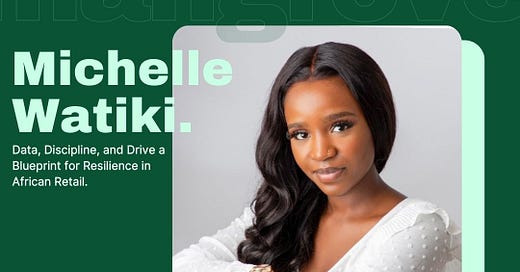Resilience Spotlight: Michelle Watiki Data, Discipline, and Drive a Blueprint for Resilience in African Retail
1. Overview of who I am
My name is Michelle Watiki, and I’m the co-founder of Duck, a data solutions company helping African retailers and consumer brands unlock growth through better use of their sales and consumer data. My background is in chemical engineering, and I began my career as an engineer in the UK nuclear defense sector, where precision and discipline were non-negotiable. While I always planned to become an entrepreneur, I hadn’t anticipated when I’d make the leap. After 4-5 years in nuclear defense, I pivoted in 2024 and co-founded Duck to solve a problem I kept seeing across the retail landscape in Africa—the lack of access to reliable, actionable data for consumer brands.
Duck is now working with leading brands and retailers across Kenya, with sights set on expanding into East Africa. We help brands consolidate their sales data across multiple retailers, empowering their commercial teams to make smarter, faster decisions on pricing, promotions, and distribution. We’ve also collaborated with RETRAK (Retail Trade Association of Kenya) on initiatives that advance data-driven retail decision-making across the region.
My leadership style is firm, assertive, and results-driven. Building a startup in Africa’s unique and sometimes non-starting friendly environment demands nothing less.
2. Resilience in Action
For me, resilience is the ability to keep pushing when you’re most uncomfortable. It’s that moment when everything in you says slow down, take cover, but you choose to move forward anyway. That’s when it counts.
I funded Duck myself in the early days. Like most founders, I’ve had to pivot our business model multiple times. Customer feedback is king, and it’s shaped everything we’ve built. The hardest challenge so far has been learning B2B enterprise sales on the continent from scratch. Coming from engineering, it wasn’t natural territory. But I’ve learned that the degrees I earned (during a pandemic, no less) taught me something deeper: if I could get through that, I could figure out anything.
When things get tough, and they do, what grounds me is my faith, the gym, and my routine. I’ve also learned to let go of things and people that aren’t working, fast. Most decisions are reversible. Sitting still is often riskier.
3. Importance of Resilience in the Startup World
Resilience, in my view, is more important than intelligence when it comes to building a startup. Intelligence helps you see the problems. Resilience helps you survive long enough to solve them.
I see founder burnout often, and it’s a stark reminder that emotional resilience is just as important, if not more so, than operational resilience. You can have the best strategy in the world, but if you can’t stay the course emotionally, it won’t matter.
I believe resilience is both innate and learned. It’s a muscle, adaptability and the ability to learn are traits I look for in every team member. In Africa, where the startup ecosystem requires a deep understanding of nuance, resilience isn’t just an advantage. It’s a survival skill.
The hardest form of resilience for me? Decision-making. Especially when perfectionism kicks in. But I’ve learned that speed is key, and that action often beats analysis.
4. Resilience in the Real World?
I’ve never run out of money at Duck, but we’ve had to move fast, often launching before we felt ready. That’s where growth happens. And while I haven’t made a bad hire yet (hopefully never!), I’ve faced skepticism as a first-time founder. Some people will wait to see if you’re serious. Resilience is showing them you are.
One of my biggest bounce-back moments wasn’t even in Duck. During an internship at a major company, I had a terrible experience with management that knocked my confidence to zero. I thought my corporate career was over before it had even begun. But I was given the chance to switch departments—and went on to get the highest performance rating available. That experience shaped me as an engineer and now as an entrepreneur. It taught me that setbacks aren’t dead ends. They’re defining moments, if you let them be.




Love to get founders take about resilience, what it means to them for not only their business but also their own mental health! Michelle is spot on about the fact that it takes practice, and whilst most of us have just to get to it when we have no other choice, at least we get to pave the way to inspire others not wait and get that muscle work for them to get extra reps in before it is too late!